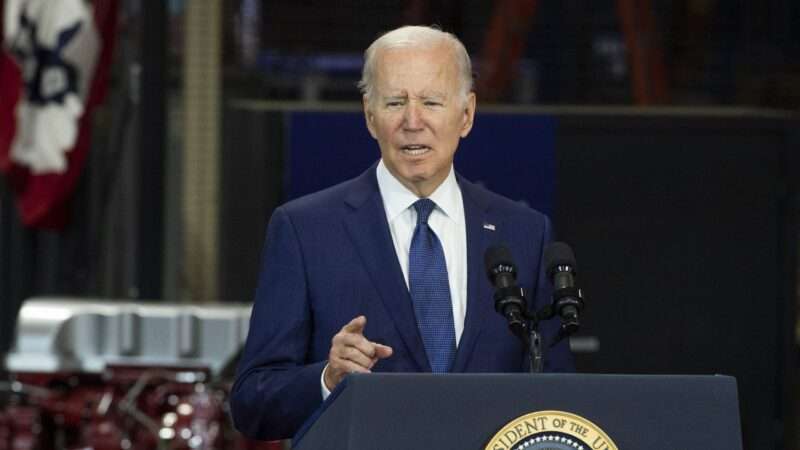
"We have to hold every drug user accountable," Sen. Joe Biden declared in 1989, "because if there were no drug users, there would be no appetite for drugs, and there would be no market for them." The mass pardon for low-level marijuana offenders that the president announced last week suggests how far he has traveled since his years as a gung-ho drug warrior, even as it demonstrates that he remains out of step with the times.
Biden's decision applies to anyone convicted of simple marijuana possession under the Controlled Substances Act or the District of Columbia Code. He said the pardons will help "thousands of people who were previously convicted of simple possession" and "who may be denied employment, housing or educational opportunities as a result."
As an act of clemency, the blanket pardon is massive. But in the context of a prohibition that has generated nearly 29 million arrests since 1965, it looks less impressive. Rep. Dave Joyce (R–Ohio), co-chair of the Congressional Cannabis Caucus, notes that "more than 14 million cannabis-related records at the state and local level continue to preclude Americans from stable housing and gainful employment."
Because simple marijuana possession is rarely prosecuted at the federal level, the vast majority of such cases are beyond the president's clemency powers. But Biden's mercy notably did not extend to people convicted of manufacturing or distributing marijuana under federal law, who still languish in prison or carry the lifelong burden of felony records.
The injustice of that situation is especially striking now that most states treat those federal felonies as legitimate business activities. Depending on the jurisdiction, the same conduct that can send someone to federal prison for years, decades, or even life can make someone else a rich and respected entrepreneur.
By himself, Biden does not have the authority to resolve the untenable conflict between state and federal marijuana laws. But despite his avowed transformation from an anti-drug zealot into a criminal justice reformer, he has stubbornly opposed efforts to repeal the federal ban on marijuana.
That position is contrary to the preferences expressed by more than two-thirds of Americans, including four-fifths of Democrats and half of Republicans. The most Biden is willing to offer them is his rhetorical support for decriminalizing cannabis consumption—a policy that was on the cutting edge of marijuana reform in the 1970s.
Fifty years ago, when less than 20 percent of Americans thought pot should be legal, the Nixon-appointed Shafer Commission recommended that "possession of marihuana for personal use no longer be an offense." President Jimmy Carter endorsed decriminalization in 1977, when he told Congress that "penalties against possession of a drug should not be more damaging to an individual than the use of the drug itself."
Half a century later, Biden has finally come around to that position. "Sending people to jail for possessing marijuana has upended too many lives—for conduct that is legal in many states," he said on Twitter last week.
The same thing is true of sending people to jail for growing or selling marijuana, of course, although that is a point Biden refuses to acknowledge. The moral logic of his distinction between simple possession and other marijuana offenses is hard to follow.
Back in 1989, when Biden was keen to show that Democrats could be even tougher on drugs than Republicans, he correctly identified the source of the problem he was fighting: Americans who defied the law by choosing to consume intoxicants that Congress had arbitrarily proscribed. Without those individual decisions, he noted, there would be no black market to suppress.
Now Biden says marijuana use should not be treated as a crime. But if so, how can helping people use marijuana justify arresting, prosecuting, and imprisoning anyone?
There is no satisfying answer to that question. And even as he recognizes the grievous harm caused by "our failed approach to marijuana," Biden has not attempted to supply one.
© Copyright 2020 by Creators Syndicate Inc.
The post Biden's Support for Pot Prohibition Belies His Recognition of the Harm It Causes appeared first on Reason.com.







